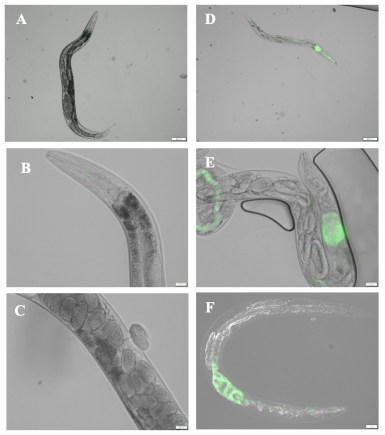Development of “wormBUSTER”; A Nematicidal Plant Probiotic Using the HG8 Nkp-1 (Nematode killing protein-1) Bacterial Producer and Plant Growth Promoting Rhizobacteria (PGPR)

Dr. Nor Hawani Salikin
Suhelen Egan
Nik Ahmad Irwan Izzauddin Nik Him
Muhammad Izzat Samir Abdul Jalil

Figure 1
Examples of normal nematode body structure (A – B) and damaged nematode body following exposure to the nematicidal HG8 bacteria (D – F). Green fluorescence indicates HG8 bacterial colonisation. Images were captured using the DIC and FITC filters under 10x (A and D) or 40x (B, C, E, F) magnifications and subsequently merged.
Supplying food for the growing global population is one of society’s major challenges, with over 2 billion people already living with insufficient food supply. Unfortunately, diseases caused by different phytopathogens and plant parasitic nematodes (PPNs) pose a substantial threat to the food industry and the situation is predicted to worsen with an estimated 35% increase in the human population by 2050. Even worse, some of the PPNs are resistant to the currently available nematicide while prolonged utilization of those chemicals resulted in environmental toxins accumulation. Furthermore, the prevalence of nematicide-resistance among PPNs is augmenting attributed to climate change which concurrently increases stressors that weaken plant resilience and diminish its productivity. Therefore, effective plant probiotics that act as bionematicide and bioenhancer are urgently needed as prevention against those parasites while enhancing plants’ growth and resilience towards the effect of climate change. This could be achieved via the manipulation of HG8 Escherichia coli recombinant clone expressing novel Nematode killing protein-1 (Nkp-1) in trans and plant growth promoting rhizobacteria (PGPR); Bacillus cereus that were both previously proven as nematicidal against the model nematode Caenorhabditis elegans. The effective formulation of HG8 and B. cereus in the “wormBUSTER” probiotics may protect plants from diseases while promoting their development and sustainability.
Problem Statement
- Agriculture and plant products are deteriorating as a result of phytopathogens, PPNs infestations and climate change which may eventually lead to human poverty, global food insecurity and insufficiency.
- A prolonged utilization of chemical nematicides such as organophosphorus and carbamate nematicides has led to a lack of field control efficacy and increased plant parasitic nematode resistance.
Novelty and Inventiveness
- Considering the increasing rate of plant parasitic nematodes (PPNs) infection and deteriorating plant productivity (both are attributed to climate change), the probiotics components in this study are composed of beneficial microbial strains which are nematicidal against the nematodes while able to promote the plant growth simultaneously. To the best of our knowledge, this feature is not addressed by the current commercial plant probiotics.
Applicability and Benefits
- Improving plant development and resilience against diseases caused by phytopathogens and PPNs infection.
- Minimize the utilization of chemical nematicides which eventually contribute to an environmentally friendly agriculture system.
Research Achievement
- Fundamental Research Grant Scheme (FRGS).
- One Postgraduate student (Master).
Commercialization Potential And Industrial Partner
- The “wormBUSTER” plant probiotic can be commercially developed for use in the biological control of plant diseases and biofertilization. It may be used worldwide and suitable to support different plants and crops in farms.
-
The University of New South Wales (UNSW), Australia.
Intellectual Property Status
Patent (applied upon completion of research).
Status of Invention
Technology Readiness Level 1 - Basic principles observed.
Impact of Innovation
- Malaysia has implemented several policies such as The National Agrofood Policy 2021-2030 (NAP 2.0), the National Food Security Policy Action Plan 2021-2025 and the Twelfth Malaysia Plan (12MP). All of those policies emphasize the self-sufficiency principle that highlights the development of agriculture sector towards self-reliance in terms of adequate agriculture products to fulfill the domestic market demand as well as at the international level. Therefore, the formulation of “wormBUSTER” plant probiotic may facilitate the government towards the accomplishment of those missions by alleviating the negative impact attributed to the PPNs nad phytopathogen infections.
- Positive improvement of the country’s economy may enhance the community socioeconomic and wellbeing particularly for the farmers and the other stakeholders.
- For academicians, this research may pave the future direction for agriculture improvement by shifting the focus from chemical nematicide/fertilizer utilization to the manipulation of microbes to enhance plants’ productivity and sustainability.
- The “wormBUSTER” formulation will also benefit the environment via the utilization of “green” biocontrol against the phytopathogens and PPNs while simultaneously improving the agriculture sector and sufficient food supply.